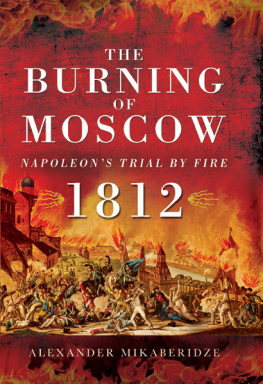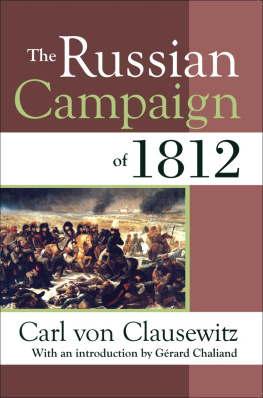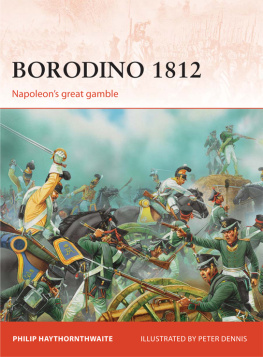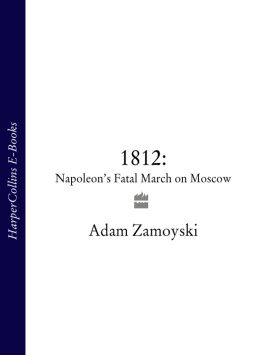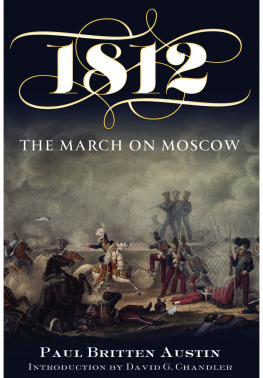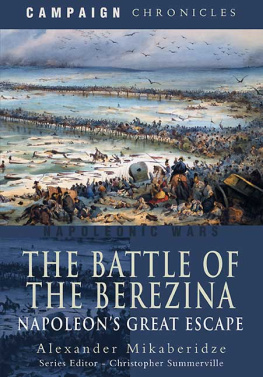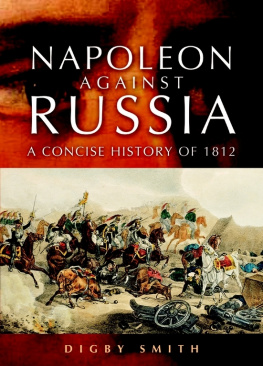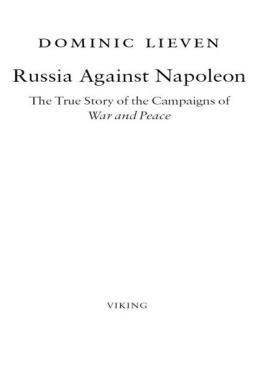First published in Great Britain in 2014 by
Pen & Sword Military
an imprint of
Pen & Sword Books Ltd
47 Church Street
Barnsley
South Yorkshire
S70 2AS
Copyright Alexander Mikaberidze 2014
HARDBACK ISBN: 978-1-78159-352-3
PDF ISBN: 978-1-47383-625-9
EPUB ISBN: 978-1-47383-449-1
PRC ISBN: 978-1-47383-537-5
The right of Alexander Mikaberidze to be identified as the Author of this
Work has been asserted by him in accordance with the Copyright, Designs
and Patents Act 1988.
A CIP catalogue record for this book is available from the British Library
All rights reserved. No part of this book may be reproduced or transmitted
in any form or by any means, electronic or mechanical including
photocopying, recording or by any information storage and retrieval system,
without permission from the Publisher in writing.
Typeset in Ehrhardt by
Mac Style, Bridlington, East Yorkshire
Printed and bound in the UK by CPI Group (UK) Ltd, Croydon,
CRO 4YY
Pen & Sword Books Ltd incorporates the imprints of Pen & Sword
Archaeology, Atlas, Aviation, Battleground, Discovery, Family History,
History, Maritime, Military, Naval, Politics, Railways, Select, Social History,
Transport, True Crime, and Claymore Press, Frontline Books, Leo Cooper,
Praetorian Press, Remember When, Seaforth Publishing and Wharncliffe.
For a complete list of Pen & Sword titles please contact
PEN & SWORD BOOKS LIMITED
47 Church Street, Barnsley, South Yorkshire, S70 2AS, England
E-mail:
Website: www.pen-and-sword.co.uk
Contents
Dedication
This book is dedicated to my brother Levan, whose encouragement, support and conscientious engagement have been a constant and indispensable source of strength and inspiration. I could not ask for a better, more loving brother.
Maps
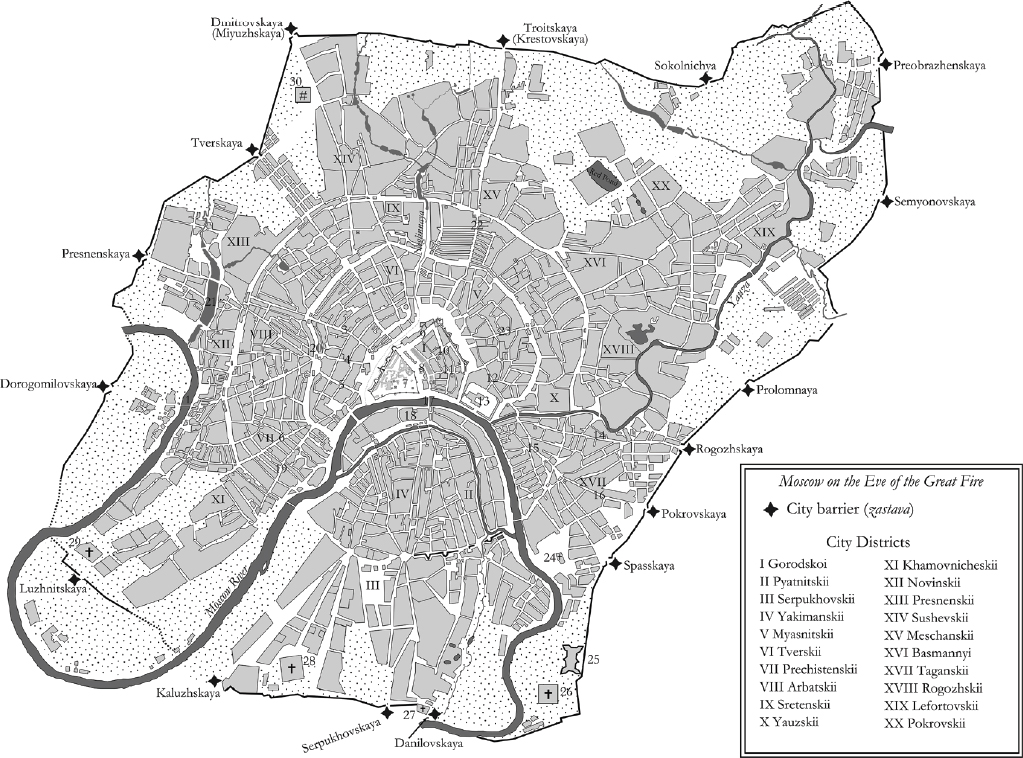
Map 1: Moscow on the eve of the Great Fire.
Key:
1. Dragomilovskaya Street
2. Arbatskaya Street
3. Nikitskaya Street
4. Vzdvizhenka Street
5. Znamenka Street
6. Prechistenka Street
7. Kremlin
8. Red Square
9. Nikolskaya Street
10. Ilyinka
11. Varvarka
12. Solyanka
13. Foundlings Home
14. Nikolaemskaya Street
15. Taganskaya
16. Semyonovskaya Street
17. Moskvoretskii Bridge
18. Zamoskvorechye
19. Ostozhenka Street
20. Tverskoi Boulevard
21. Presnenskii Ponds
22. Meschanskaya Street
23. Pokrovka
24. Novospasskii Monastery
25. Powder Magazines
26. Simonov Monastery
27. Danilov Monastery
28. Donskoi Monastery
29. Novodevichii Convent
30. Prison
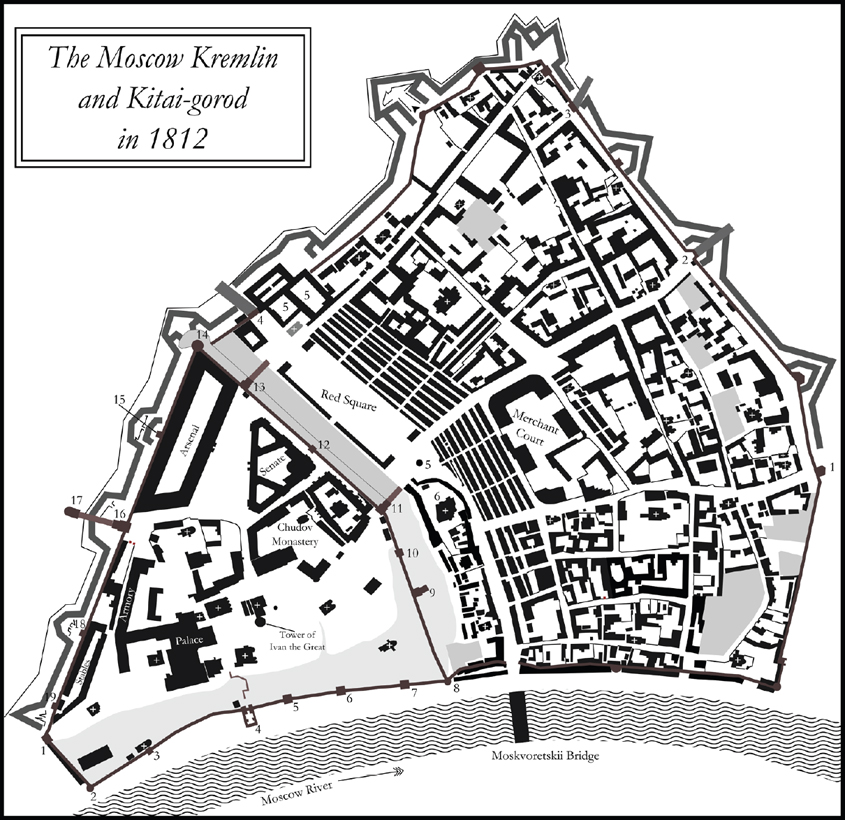
Map 2
In Kremlin:
1. Borovitskaya Tower
2. Vodovzvodnaya (Water-lifting) Tower
3. Blagoveschenskaya (Annunciation) Tower
4. Taynitskaya (Secret) Tower
5. First Unnamed (Bezymyannaya) Tower
6. Second Unnamed (Bezymyannaya) Tower
7. Petrovskaya Tower
8. Beklemishevskaya (Moskvoretskaya) Tower
9. Konstantino-Eleninskaya Tower
10. Nabatnaya Tower
11. Spasskaya (Saviour) Tower
12. Senatskaya Tower
13. Nikolskaya Tower
14. Corner Arsenalnaya (Arsenal) Tower
15. Middle Arsenalnaya (Arsenal) Tower
16. Troitskaya (Trinity)
17. Kutafya Barbican Tower
18. Komendatskaya (Commandants) Tower
19. Oruzheinaya (Armoury) Tower
In Kitai-gorod:
1. Varvarskie Gates
2. Ilyinskie Gates
3. Nikolskie Gates
45. Governors Mansion and other buildings of municipal administration
6. St Basils Cathedral
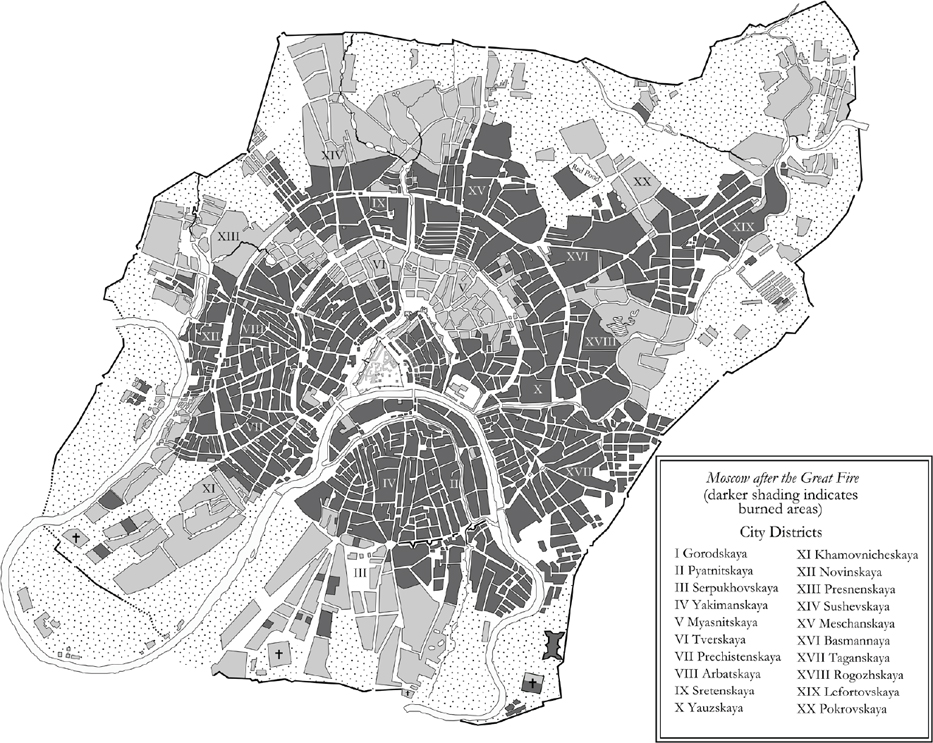
Map 3: Moscow after the Great Fire.
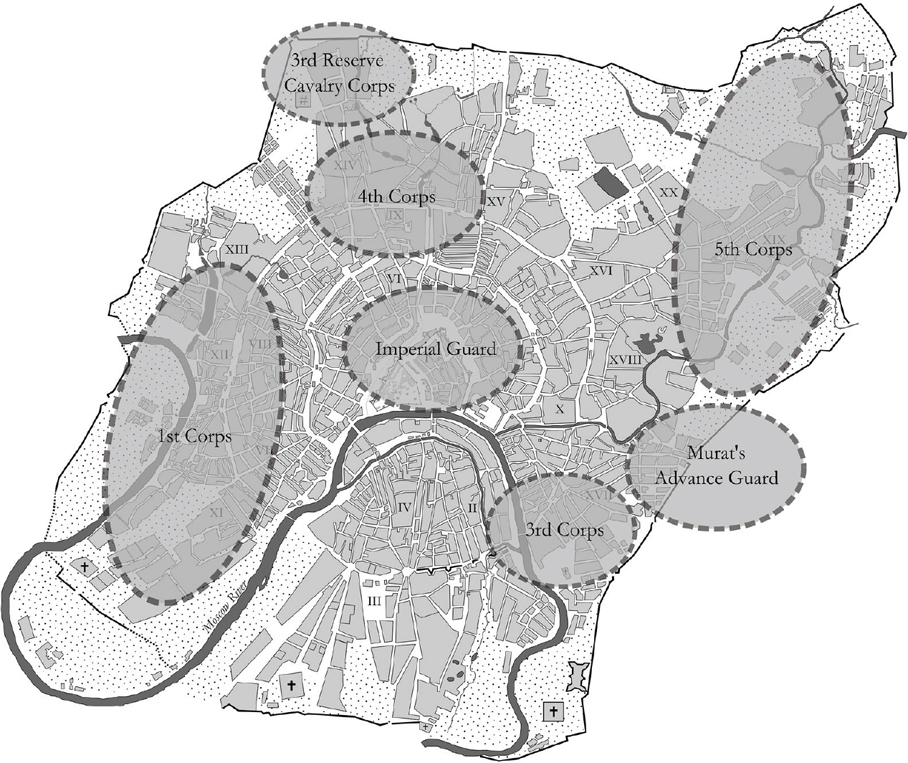
Map 4 Initial deployment of Allied troops in Moscow, 1529 September 1812.
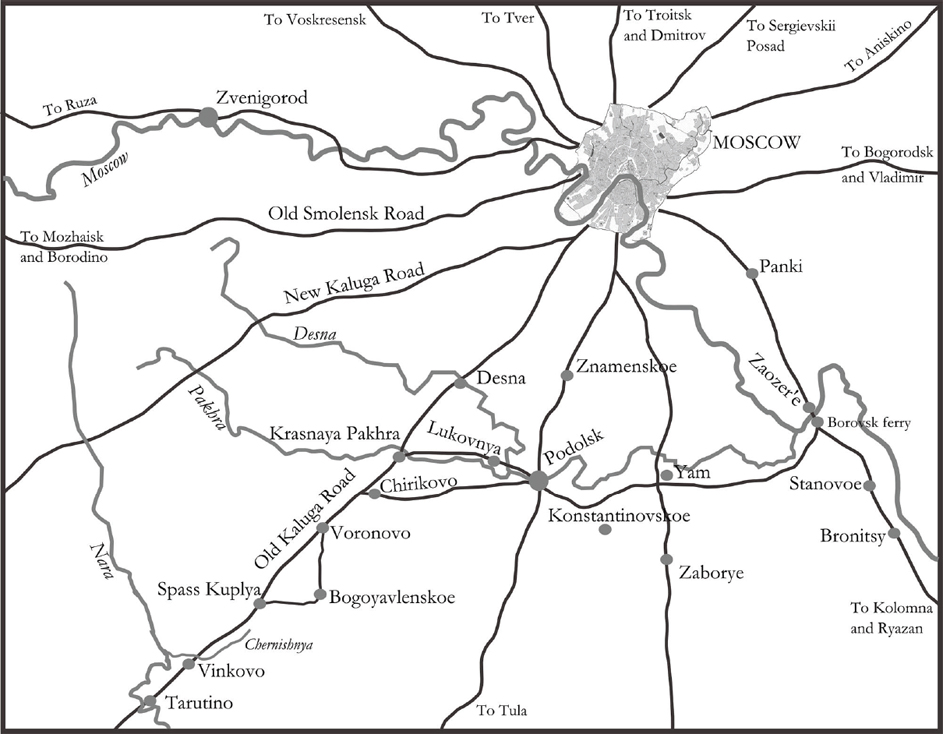
Map 5: Moscow and its environs, 1812.
Preface
It is impossible to express the astonishment and dismay that the news of the burning of Moscow has produced in Paris. People have long forgotten about the effects of war that push people to the extremes. Despite the time elapsed since the bulletin brought this news to Paris, the impression that it has made still endures. This is one of those events whose consequences are incalculable and the more we reflect upon it, the more insights we gain.
I n 1802, just slightly over one year after ascending to the throne of the Russian empire, Emperor Alexander I was informed of rather disturbing news. A certain monk Abel, who was said to have possessed a rare gift of foreseeing the future, had written a book of revelations. It would have been easy to dismiss his writing as the product of rampant imagination, were it not for the monks correct prior predictions, including of the deaths of Empress Catherine II and Emperor Paul I. In March 1796 Catherine II, upon learning of Abels prophecy of her death, had him confined to the Schlsselburg Fortress but just eight months later she suddenly passed away on the very day and hour predicted by Abel, as General Alexei Yermolov noted. Catherines son Paul had him released and brought to the imperial palace. They had a long private talk, at the end of which the emperor ordered Abel to be accommodated at a privileged monastery and that all his needs be met.
A year later Abel made another worrisome prediction, and history repeated itself. Arrested in May 1800 for various writing containing prophecies and other literary nonsense, the monk was released after Emperor Paul was assassinated by conspirators on the very night Abel had foretold. Pauls successor, Emperor Alexander, initially followed his fathers example in treating the monk well until he was informed that the monk had produced yet another book of prophecies. This time the monks predictions were even more ominous, as he spoke of a future invasion of Russia by enemy hordes and the fall of the glorious city of Moscow. Alarmed by this prediction, Alexander commanded that the prophet be thrown into prison and remain there until his prophecy comes true. Ten years passed before Abels prediction was fulfilled Napoleons Grande Arme crossed the Russian borders and Moscow fell and burned in September 1812. Just a month later Emperor Alexander released Abel from prison and ordered the monk to be well looked after for the rest of his life. Judging from the surviving documents, Abel lived a fairly quiet and untroubled life until his death in 1841.
Historians have long agreed that the fiery destruction of Moscow was one of decisive factors in Napoleons fiasco in 1812. Russia loomed large in Napoleons mind. With war against Britain already entering its tenth year in 1812, the emperor was eager to find a way to subdue his stalwart enemy. The Continental Blockade, Napoleons effort to defeat Britain by denying her access to European markets, required the involvement of all European states, most importantly Russia. In the summer of 1807 Emperor Alexander I, his army defeated by Napoleon, accepted the Treaty of Tilsit and joined the Continental Blockade. However, Russian involvement proved to be lukewarm at best. The embargo on British trade led to a sharp decrease in Russian foreign trade, which in turned produced profound financial strains. These economic tribulations forced the Russian government gradually to relax the enforcement of the blockade, an action that incurred Napoleons wrath. Franco-Russian relations remained tense in other areas as well, most notably over the future of Poland and the conflicting interests in Germany and the Balkan peninsula.
Next page
